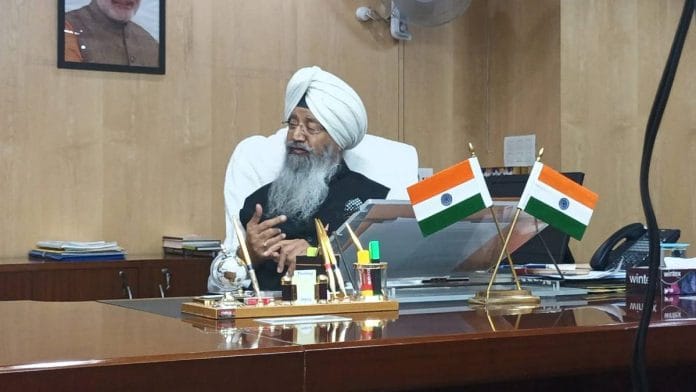New Delhi: Apprehensions over the proposed Uniform Civil Code (UCC) are intentionally being “created” to confuse the public, according to Iqbal Singh Lalpura, chairperson of the National Commission for Minorities.
In a conversation with ThePrint, Lalpura pointed out that a UCC was envisioned under Article 44 of the Constitution— which says that the State shall endeavour to secure a Uniform Civil Code throughout India.
“Article 44 was mentioned in the Constitution of India which means that our forefathers had envisioned the need for this law way back in 1950. So, the UCC is merely a compliance with our constitutional obligations,” he said.
“However, this was not implemented. A minority judge had later felt the need for UCC in the 1990s. Many judgments have come that talk about the need for a Uniform Civil Code,” he added.
Lalpura also questioned the concerns of minority communities over a perceived ‘threat’ to their distinct identities.
“England also has UCC, don’t the Sikh or Muslim community have a separate identity there? These apprehensions are being created to confuse the people. In America, which is termed as the biggest democracy, it is the same,” he said. “If religions adjust there (in UK, US, and France) why won’t they in India?”
The UCC refers to a common set of laws on marriage, divorce, and inheritance that would be applicable to all Indian citizens irrespective of religion, rather than the community-specific personal laws that presently govern such matters.
The 22nd Law Commission sought views from the public and religious organisations on the UCC last month, reigniting the debate on the matter. Prime Minister Narendra Modi also made a strong pitch for uniform laws for people across communities during a rally in Madhya Pradesh this June.
Lalpura said that a previous Law Commission had already prepared a document on the UCC back in 2018. However, he added, with the formation of a new Law Commission, feedback was being sought from the public.
“I would suggest to everyone that they should read that paper and send their suggestions to the Commission,” Lalpura said.
Also Read: Opposition is wrong in resisting UCC. It’s poor politics, runs against Constitution spirit
‘Job of Opposition is to oppose’
Various prominent organisations, including the Shiromani Gurdwara Parbandhak Committee (SGPC) and the All India Muslim Personal Law Board (AIMPLB), have expressed reservations over the proposed UCC, with the AIMPLB going as far as to term it as a “political stunt”.
Some opposition leaders have also claimed that raising the issue is a strategic move by the ruling BJP to create divisions among the electorate before the 2024 Lok Sabha elections, while others contend that it infringes upon religious freedom.
“The job of the Opposition is to oppose. The times have changed so much that the political discourse has really come down. We should know whether we are criticising the person or the policy,” Lalpura said. “We shouldn’t be going abroad and indulging in criticism there.”
According to Lalpura, there have been some precedents for the UCC in India.
“UCC has been “implemented in Goa since 1867 and the Portuguese did it. There is no conflict there,” he said.
The NCM chief also drew attention to the Anand Marriage Act, which was formed in 1909 for the registration of Sikh marriages in India. Its name comes from Anand Karaj, the Sikh religious ceremony for marriages.
“The Anand Marriage Act was formed in 1909 but till date, the rules were not formed. In Punjab, which has the highest number of Sikhs, the Anand Marriage Act is still not applicable,” he said.
Last November, Punjab Chief Minister Bhagwant Mann had also stated that the Anand Marriage Act, which was notified in 2016, was yet to come into effect in Punjab, although it has been implemented in several other states and Union territories.
Lalpura said that the Sikh community does not have its own law to govern divorces. “Many Sikhs follow the Hindu Marriage Act in a way,” he explained. He further noted that the Muslim and Sikh communities do not have an adoption law either.
The minorities commission chief advised various groups to share “whatever apprehension or suggestions they have with the Law Commission”.
(Edited by Asavari Singh)
Also Read: UCC could be around the corner, but divorce still comes in many colours in India






